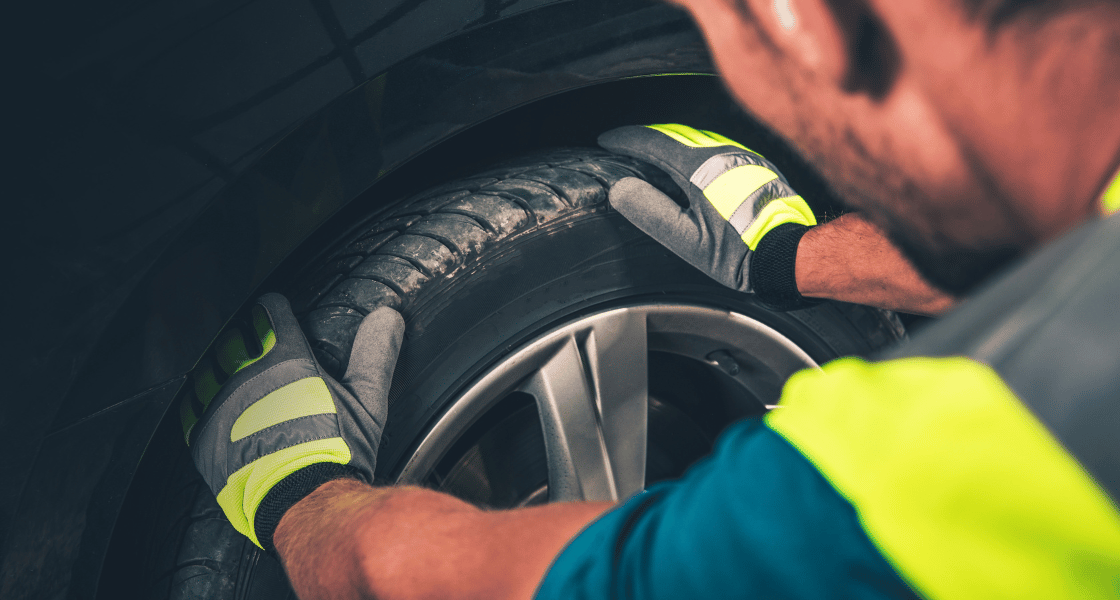When it comes to maintaining optimal tire performance and safety, the choice between using nitrogen or regular air can make a significant difference.
Tires with nitrogen have gained popularity in recent years due to their benefits over traditional air filled tires: enhanced tire longevity, fuel efficiency, and overall driving experience.
In this article, we will explore the benefits of nitrogen versus air-inflated tires, shedding light on why numerous drivers are making the switch and how it can positively impact your vehicle’s performance!
Table of Contents
ToggleWhat are the Advantages of Using Nitrogen for Car Tires?
Maintaining Tire Inflation Pressure
One of the most important benefits is maintaining inflation pressure. The large size of nitrogen molecules doesn’t allow them to permeate through the tire walls as easily as oxygen, causing it to lose pressure 40% slower than compressed air.
Resisting Pressure Drops Caused by Temperature Fluctuations
Nitrogen gas also resists pressure drops from temperature changes. Unlike oxygen, which expands and contracts with temperature readily, nitrogen maintains its pressure much better even in cold temperatures!
Less Oxidation and Degradation
Tires filled with nitrogen also experience less oxidation and degradation, which helps them stay in prime shape for longer. Unlike compressed air, which contains oxygen and water vapor, pure nitrogen is a dry gas, meaning it doesn’t react to the environment surrounding it.
Normally, the oxygen and water vapor in compressed air cause the tire to rust or oxidize overtime, leading to damage. However, since pure nitrogen is dry, it won’t allow that rust or oxidation to occur, keeping your tires in better condition for longer.
Less Tire Maintenance
Nitrogen tires can also be more convenient than conventional ones by requiring less maintenance and refillings.
Air-filled tires typically need a refill every 7-10 days, which can be time consuming and frustrating for drivers.
In contrast, nitrogen tires last for a month before needing to be checked at a refill station, making them the more convenient, higher performing, and more consistent option for tire inflation.
Do Nitrogen-Filled Tires Make a Difference for High-Performance Vehicles?
High-performance vehicles demand optimal tire performance to unleash their full potential on the road or track. This is where the use of tires with nitrogen can make a significant difference.
By utilizing nitrogen for high-performance vehicles, drivers can unlock the full potential of their machines, experiencing enhanced control, improved safety, maximized performance, and a thrilling driving experience!
How Will Nitrogen Inflation Improve Your Driving Experience?
Driving your car at optimum inflation levels will make your ride much smoother, especially on the highway, as your tires are able to better support the weight of your car.
Nitrogen filled tires maintain proper tire pressure, which is crucial for achieving precise handling, cornering, and braking capabilities.
The reduced pressure loss over time ensures that the tires remain at the recommended pressure, even under extreme driving conditions. This makes nitrogen tires the tire of choice for race cars and high performing vehicles, where even the smallest margins of change can cause dramatic differences.
Does Nitrogen Tire Inflation Guarantee Better Fuel Economy?
There is nothing inherently magical about nitrogen that will make your car lighter or use less gas on its own. Rather, maximized fuel economy can be experienced with any inflation medium provided that it is kept at proper levels.
However, maintaining proper tire pressure can be difficult and time consuming with 85% of Americans failing to check their tire pressure regularly.
Nitrogen saves you money by compensating for the tedious maintenance most tires require. Studies show that for those who don’t check their pressure regularly, nitrogen in tires saves 6% or $119 annually on fuel costs. This means that while nitrogen doesn’t magically save gas, if you’re one of the 85% of Americans who don’t regularly check tire pressure, it will certainly help you maximize your personal fuel economy!
Is the Use of Nitrogen Over Air Cost-Effective in the Long Run?
While the initial cost of nitrogen-filled tires may be slightly higher compared to regular air filled tires, the long-term savings they offer more than offset this expense.
One of the significant advantages of nitrogen is its ability to maintain tire pressure over an extended period, leading to reduced tire wear, improved fuel efficiency, and increased tread life.
With nitrogen, you’ll experience fewer instances of underinflation, which can cause premature tire wear and decrease fuel economy.
Moreover, nitrogen’s resistance to moisture and oxidation helps prevent internal tire damage and corrosion, resulting in longer-lasting tires.
By investing in nitrogen-filled tires, you’ll save money on frequent tire replacements, enjoy improved fuel efficiency, and benefit from extended tire life. The long-term savings gained from these factors make nitrogen tires a cost-effective choice for budget-conscious drivers who prioritize long-lasting performance and reliability!
Ready to Optimize Your High-Performance Vehicle’s Tire Performance?
At Fuel and Tire Saver, we offer a nitrogen tire inflation service as a cost-effective solution for optimizing tire performance!
Our team is committed to the science behind nitrogen tire inflation and can work with you to develop a customized tire maintenance plan that meets the unique needs of your fleet.
Contact Fuel and Tire Saver and check out our resources page to learn more about our nitrogen-filled tires and how we can help keep your fleet rolling smoothly!
References
- How Nitrogen-Inflated Tires Can Improve Fuel Efficiency | Fuel and Tire Saver — Accessed 22 May 2023.
- Is Nitrogen Inflation Really More Expensive Than Air Inflation? | Fuel and Tire Saver — Accessed 22 May 2023.
- Should You Really Put Nitrogen in Your Car Tires? | Popular Mechanics — Accessed 22 May 2023.
- The Importance of Proper Nitrogen Pressure for Optimal Tire Performance | Fuel and Tire Saver — Accessed 22 May 2023.


